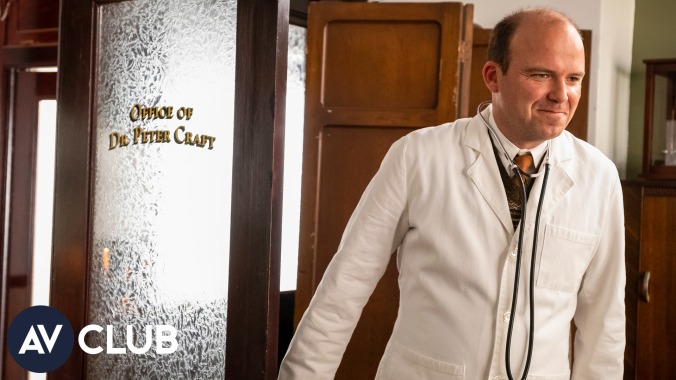Rory Kinnear on Nazis, isolationism, and the tiny people who live in your trunk
TV Features Rory Kinnear
Set in 1930s Los Angeles, Showtime’s new Penny Dreadful: City Of Angels finds the city in turmoil. Religious evangelists are stirring the pot on the radio. Callous councilmen are destroying whole immigrant neighborhoods in an attempt to lay down a highway the city doesn’t really need, and German-American members of the Nazi party are stomping all over the place trying to keep America out of WWII. Penny Dreadful veteran Rory Kinnear plays Dr. Peter Craft, a member of the latter set of rabble-rousers, and he’s bringing a level of knowledge about American isolationism at the time that a lot of actors couldn’t. The A.V. Club sat down with Kinnear earlier this year to talk about that sentiment, as well as what mystical creatures gave the actor the heebie-jeebies when he was just a boy.

6 Comments
He refers to the Bund as “the progenitor of the America First movement”, but it should be noted that the American First organization prohibited Bundists and communists (who also opposed American intervention while the Molotrov-Ribbentrop pact was in place) from membership. They did not want to indicate any attachments to other countries, although having non-English ancestry would have been correlated with opposing support to England. I had been under the impression that, like the Communist Party, the Bund was loyal to a foreign government, but I haven’t researched it and Kinnear could be right. It is rather odd that the text below the video describes his character as being “a member of the […] set” of “German-American members of the Nazi party”, when Kinnear in the actual video says his character is part of a faction of the Bund which is just focused on German-American culture rather than Nazis. Furthermore, I don’t think even many Bundists actually had membership in the Nazi party, since they wouldn’t be able to have much participation in German politics while in America and an American Nazi party wouldn’t be politically viable (the communists were marginal, but they had a transnational ideology that could appeal to multiple ethnic groups).
Artists always think that they are experts in fields outside of their own even when they are not. They have a right to their opinions like every citizen but I wouldn’t get any political epiphanies from their echo chamber thoughts.
By the way, the actual German government really tried to get the Bund to shut up and lay low and never gave them any support.
Ahh, methinks Leni Riefenstahl might have something to something to say about that. Or, at least, most people can draw some epiphanies from her actions as an auteur….
Artists always think that they are experts in fields outside of their own even when they are not. They have a right to their opinions like every citizen but I wouldn’t get any political epiphanies from their echo chamber thoughts. Artists research historical roles largely by reading books written by experts in fields outside of their own, and the quality of their understanding often closely tracks the quality of their sources — just like any other person who knows things from reading books. Calling them “echo chamber thoughts” seems overly dismissive, as does assuming they think they’re experts when they’re simply trying to answer a question.
He refers to the Bund as “the progenitor of the America First movement”, but it should be noted that the American First organization prohibited Bundists and communists (who also opposed American intervention while the Molotrov-Ribbentrop pact was in place) from membership. Why “should it be noted”? How is that at all relevant to the wider point …?
It’s not impossible for one movement to have an offshoot which prohibits membership in the parent movement (factionalism being what it is), but it’s atypical. And the America First Committee was not founded by German-Americans, let alone Bundists, but some Yale law students (R. Douglas Stuart Jr, Gerald Ford, Sargent Shriver, Potter Stewart and others). I actually can’t think of any ethnic German members, although I expect that some existed and perhaps just kept their heads down. At any rate, it doesn’t make sense to say the Bund begat the AFC if there was basically no connection.